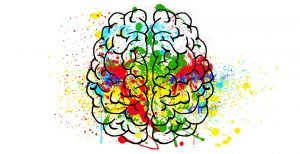 Our brains can become overwhelmed when we have feelings of anger, worry, fear, sadness and pain. Even less dramatic feelings like the exhaustion of managing daily life can overwhelm the brain.
Our brains can become overwhelmed when we have feelings of anger, worry, fear, sadness and pain. Even less dramatic feelings like the exhaustion of managing daily life can overwhelm the brain.
Stressed Brains
Stressed brains become very noisy – constantly checking for the next problem. Ruminating. Chattering. Worrying. Fretting about what comes next. Judging what came before. Thoughts whirl around, layered one on another or competing with one another. That depletes cognitive and emotional resources, leading us to experience stress, tension and agitation.
The only fix is calming down
Remarkably, even a few minutes of calm a day can help. How? That’s what all the talk about mindfulness is about. Mindfulness is simply paying attention to what you’re doing at the moment. It means noticing and trying gently to be fully aware of your current activity. It is simplicity of thought, which is why it soothes a brain lost in complexity. Mindfulness can be as simple as fully savoring the sensations of slowly eating a raisin, beginning with investigating its feel in your fingers, noticing what happens when you squeeze it a bit, taking in the fragrance of the raisin, slowly tasting it and playing with it in your mouth. Mindfulness can be noticing what your feet feel with each step, or paying attention to the sounds in the environment when you take a short walk. It can even mean fully engaging in the experience of washing dishes as if you’ve never done it before, with the kind of curious delight your 4-year-old would have washing a few dishes.
Short term effects
Mindfulness brings full attention of your conscious brain to one thing. When that happens, your brain becomes calm. The busy chatter, planning and worrying get turned off for a little while. The calming effect is experienced by your whole body, as muscles relax. Breathing deepens and your heart slows. You feel more open; less depleted. This feels better subjectively, but it is also restorative. The brain and body briefly recover from being stressed and overwhelmed.
Long term effects
Taking mindful breaks a few times a day is a quick, though brief anecdote to feeling overwhelmed and stressed. Over time, you learn to become more mindful, less scattered, in daily activities. You build skill in being absorbed and effective across the board and you experience a greater sense of calm and wellbeing. Actual physiological changes occur as mindfulness practices continue, among them improved blood pressure and decreased cortisol, the stress inducing hormone.
Personal Practices
The sense of wellbeing is what draws many people to personal practices. Mindfulness is actually an aspect of just about all such practices. Meditation and yoga are mindful activities. As are gratefulness, journaling and getting absorbed in nature.
Some forms of meditation involve focusing on something like the breath or a mantra. In others, the mind observes its thoughts with openness and curiosity. Each is a mindful, “present moment” experience. You’ll find an introduction to meditation in the video.
Yoga, which means “union,” has many aspects. The best known is the series of postures and breathing used in Hatha Yoga. While some people view this as “exercise,” it is a practice that brings one into present moment awareness.
We feel gratitude in the present, not imagining past or future moments. In feeling grateful, we are taking in the current moment. We don’t think, “that’s a beautiful rainbow, not as nice as the one I saw last week, but still nice.” That is a thought. A judgement. Not a feeling of gratitude. You can find out more about gratefulness practices beginning here.
Whichever practice (or practices) you are drawn to can bring greater wellbeing and each can calm down a stressed overwhelmed mind.
Learning more & creating a practice that’s right for you
We are each drawn to particular practices and prefer some over others. It’s good to explore and be curious. You can advantage of the many courses, YouTube videos, podcasts and other sources.